Business Dissertation: Leadership Style and Employee Motivation
VerifiedAdded on 2023/01/19
|33
|10972
|31
Thesis and Dissertation
AI Summary
This dissertation investigates the effects of leadership style on employee motivation within Aaron Enterprise, New Delhi, India, a kitchen products manufacturer. It employs a deductive research approach, beginning with a literature review to establish the research aim, objectives, and hypotheses. The study justifies its importance by addressing the need for understanding how leadership impacts employee morale, productivity, and retention. The methodology encompasses research methods, philosophies, approaches, design, data collection, and analysis, including univariate analysis and hypothesis testing. A questionnaire-based survey was conducted among employees to gather data. The research explores the link between leadership styles and employee commitment to long-term productivity, concluding with findings, discussions, and a bibliography, with the goal of providing insights into effective leadership practices for organizational success.
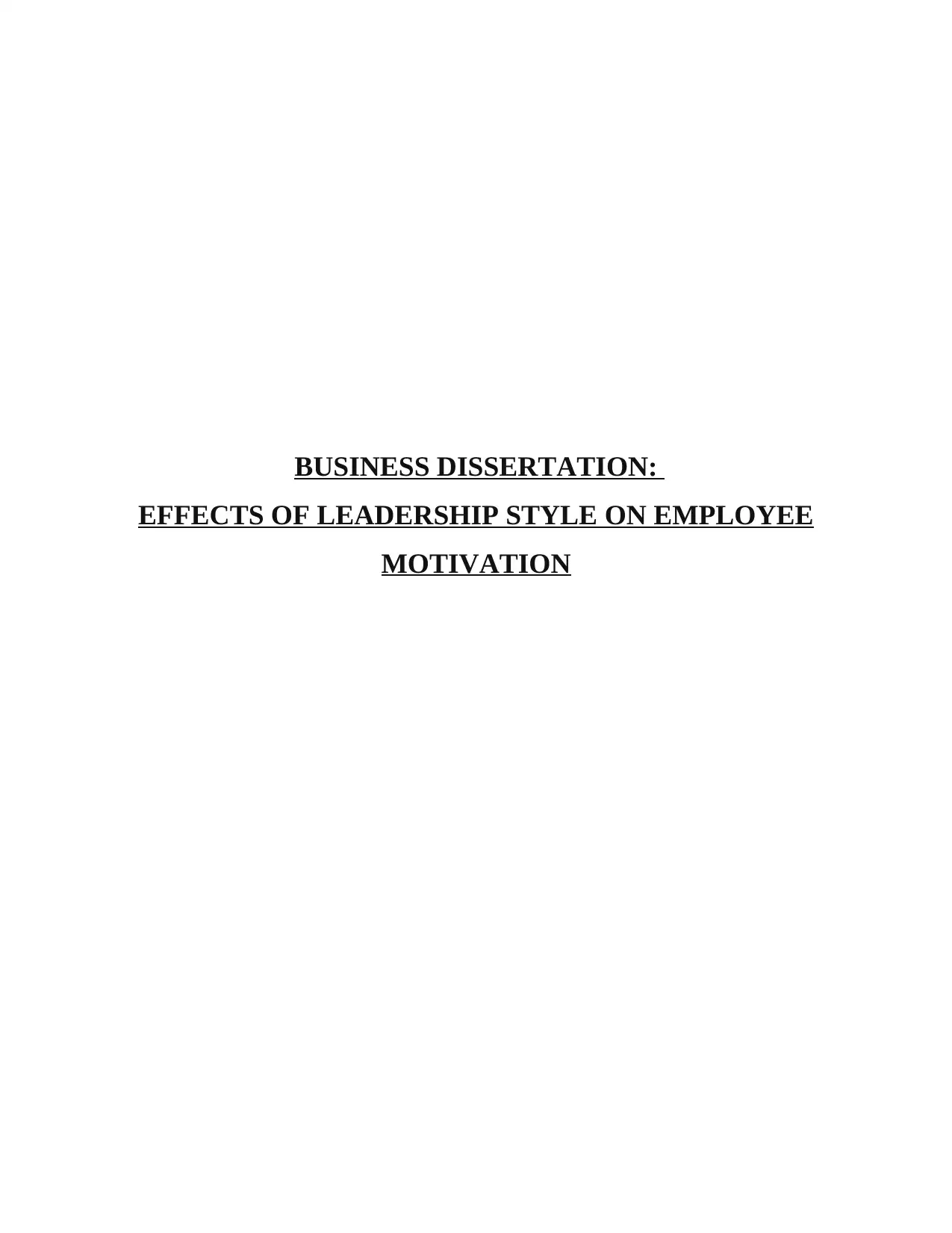
BUSINESS DISSERTATION:
EFFECTS OF LEADERSHIP STYLE ON EMPLOYEE
MOTIVATION
EFFECTS OF LEADERSHIP STYLE ON EMPLOYEE
MOTIVATION
Paraphrase This Document
Need a fresh take? Get an instant paraphrase of this document with our AI Paraphraser
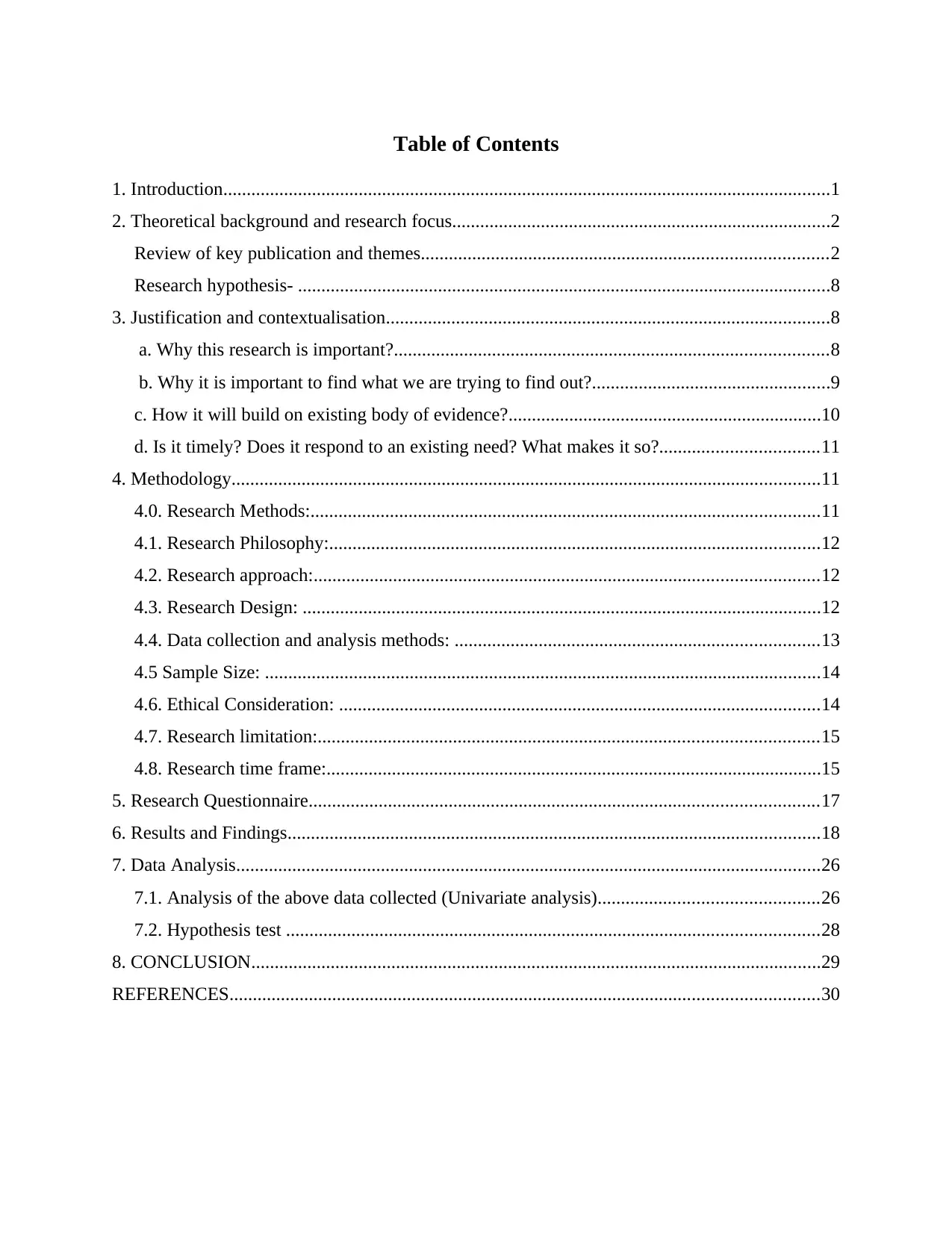
Table of Contents
1. Introduction..................................................................................................................................1
2. Theoretical background and research focus.................................................................................2
Review of key publication and themes.......................................................................................2
Research hypothesis- ..................................................................................................................8
3. Justification and contextualisation...............................................................................................8
a. Why this research is important?.............................................................................................8
b. Why it is important to find what we are trying to find out?...................................................9
c. How it will build on existing body of evidence?...................................................................10
d. Is it timely? Does it respond to an existing need? What makes it so?..................................11
4. Methodology..............................................................................................................................11
4.0. Research Methods:.............................................................................................................11
4.1. Research Philosophy:.........................................................................................................12
4.2. Research approach:............................................................................................................12
4.3. Research Design: ...............................................................................................................12
4.4. Data collection and analysis methods: ..............................................................................13
4.5 Sample Size: .......................................................................................................................14
4.6. Ethical Consideration: .......................................................................................................14
4.7. Research limitation:...........................................................................................................15
4.8. Research time frame:..........................................................................................................15
5. Research Questionnaire.............................................................................................................17
6. Results and Findings..................................................................................................................18
7. Data Analysis.............................................................................................................................26
7.1. Analysis of the above data collected (Univariate analysis)...............................................26
7.2. Hypothesis test ..................................................................................................................28
8. CONCLUSION..........................................................................................................................29
REFERENCES..............................................................................................................................30
1. Introduction..................................................................................................................................1
2. Theoretical background and research focus.................................................................................2
Review of key publication and themes.......................................................................................2
Research hypothesis- ..................................................................................................................8
3. Justification and contextualisation...............................................................................................8
a. Why this research is important?.............................................................................................8
b. Why it is important to find what we are trying to find out?...................................................9
c. How it will build on existing body of evidence?...................................................................10
d. Is it timely? Does it respond to an existing need? What makes it so?..................................11
4. Methodology..............................................................................................................................11
4.0. Research Methods:.............................................................................................................11
4.1. Research Philosophy:.........................................................................................................12
4.2. Research approach:............................................................................................................12
4.3. Research Design: ...............................................................................................................12
4.4. Data collection and analysis methods: ..............................................................................13
4.5 Sample Size: .......................................................................................................................14
4.6. Ethical Consideration: .......................................................................................................14
4.7. Research limitation:...........................................................................................................15
4.8. Research time frame:..........................................................................................................15
5. Research Questionnaire.............................................................................................................17
6. Results and Findings..................................................................................................................18
7. Data Analysis.............................................................................................................................26
7.1. Analysis of the above data collected (Univariate analysis)...............................................26
7.2. Hypothesis test ..................................................................................................................28
8. CONCLUSION..........................................................................................................................29
REFERENCES..............................................................................................................................30
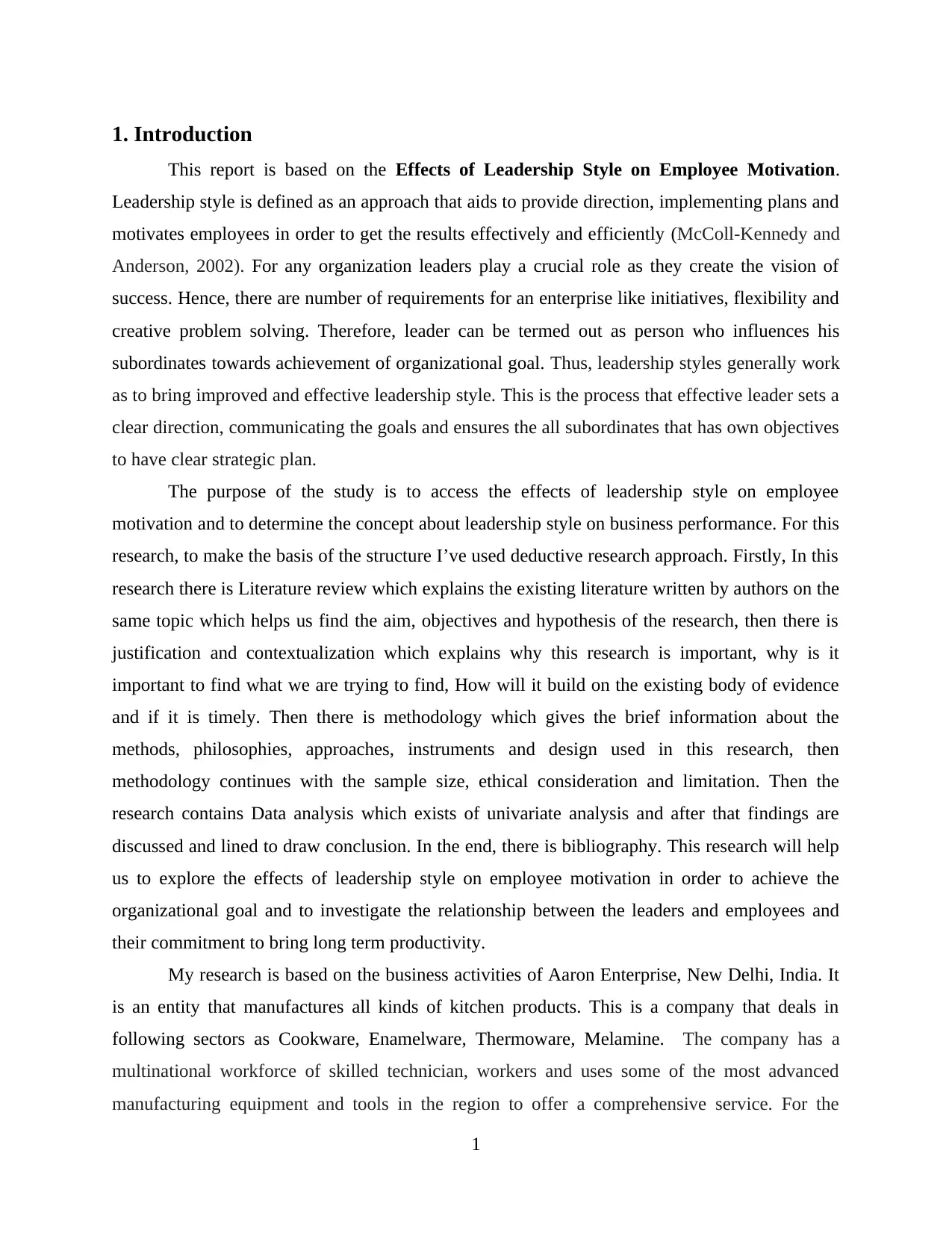
1. Introduction
This report is based on the Effects of Leadership Style on Employee Motivation.
Leadership style is defined as an approach that aids to provide direction, implementing plans and
motivates employees in order to get the results effectively and efficiently (McColl-Kennedy and
Anderson, 2002). For any organization leaders play a crucial role as they create the vision of
success. Hence, there are number of requirements for an enterprise like initiatives, flexibility and
creative problem solving. Therefore, leader can be termed out as person who influences his
subordinates towards achievement of organizational goal. Thus, leadership styles generally work
as to bring improved and effective leadership style. This is the process that effective leader sets a
clear direction, communicating the goals and ensures the all subordinates that has own objectives
to have clear strategic plan.
The purpose of the study is to access the effects of leadership style on employee
motivation and to determine the concept about leadership style on business performance. For this
research, to make the basis of the structure I’ve used deductive research approach. Firstly, In this
research there is Literature review which explains the existing literature written by authors on the
same topic which helps us find the aim, objectives and hypothesis of the research, then there is
justification and contextualization which explains why this research is important, why is it
important to find what we are trying to find, How will it build on the existing body of evidence
and if it is timely. Then there is methodology which gives the brief information about the
methods, philosophies, approaches, instruments and design used in this research, then
methodology continues with the sample size, ethical consideration and limitation. Then the
research contains Data analysis which exists of univariate analysis and after that findings are
discussed and lined to draw conclusion. In the end, there is bibliography. This research will help
us to explore the effects of leadership style on employee motivation in order to achieve the
organizational goal and to investigate the relationship between the leaders and employees and
their commitment to bring long term productivity.
My research is based on the business activities of Aaron Enterprise, New Delhi, India. It
is an entity that manufactures all kinds of kitchen products. This is a company that deals in
following sectors as Cookware, Enamelware, Thermoware, Melamine. The company has a
multinational workforce of skilled technician, workers and uses some of the most advanced
manufacturing equipment and tools in the region to offer a comprehensive service. For the
1
This report is based on the Effects of Leadership Style on Employee Motivation.
Leadership style is defined as an approach that aids to provide direction, implementing plans and
motivates employees in order to get the results effectively and efficiently (McColl-Kennedy and
Anderson, 2002). For any organization leaders play a crucial role as they create the vision of
success. Hence, there are number of requirements for an enterprise like initiatives, flexibility and
creative problem solving. Therefore, leader can be termed out as person who influences his
subordinates towards achievement of organizational goal. Thus, leadership styles generally work
as to bring improved and effective leadership style. This is the process that effective leader sets a
clear direction, communicating the goals and ensures the all subordinates that has own objectives
to have clear strategic plan.
The purpose of the study is to access the effects of leadership style on employee
motivation and to determine the concept about leadership style on business performance. For this
research, to make the basis of the structure I’ve used deductive research approach. Firstly, In this
research there is Literature review which explains the existing literature written by authors on the
same topic which helps us find the aim, objectives and hypothesis of the research, then there is
justification and contextualization which explains why this research is important, why is it
important to find what we are trying to find, How will it build on the existing body of evidence
and if it is timely. Then there is methodology which gives the brief information about the
methods, philosophies, approaches, instruments and design used in this research, then
methodology continues with the sample size, ethical consideration and limitation. Then the
research contains Data analysis which exists of univariate analysis and after that findings are
discussed and lined to draw conclusion. In the end, there is bibliography. This research will help
us to explore the effects of leadership style on employee motivation in order to achieve the
organizational goal and to investigate the relationship between the leaders and employees and
their commitment to bring long term productivity.
My research is based on the business activities of Aaron Enterprise, New Delhi, India. It
is an entity that manufactures all kinds of kitchen products. This is a company that deals in
following sectors as Cookware, Enamelware, Thermoware, Melamine. The company has a
multinational workforce of skilled technician, workers and uses some of the most advanced
manufacturing equipment and tools in the region to offer a comprehensive service. For the
1
⊘ This is a preview!⊘
Do you want full access?
Subscribe today to unlock all pages.

Trusted by 1+ million students worldwide
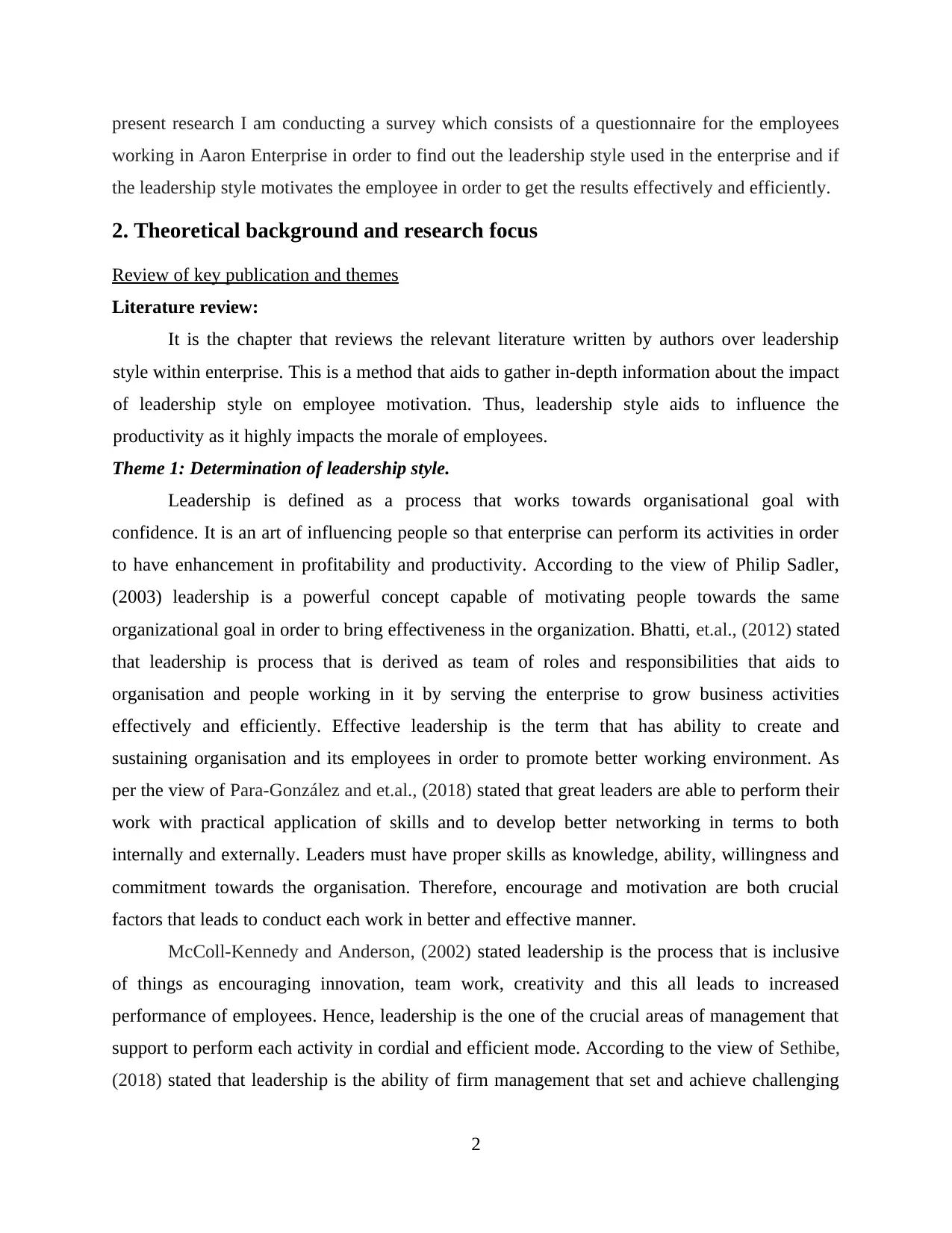
present research I am conducting a survey which consists of a questionnaire for the employees
working in Aaron Enterprise in order to find out the leadership style used in the enterprise and if
the leadership style motivates the employee in order to get the results effectively and efficiently.
2. Theoretical background and research focus
Review of key publication and themes
Literature review:
It is the chapter that reviews the relevant literature written by authors over leadership
style within enterprise. This is a method that aids to gather in-depth information about the impact
of leadership style on employee motivation. Thus, leadership style aids to influence the
productivity as it highly impacts the morale of employees.
Theme 1: Determination of leadership style.
Leadership is defined as a process that works towards organisational goal with
confidence. It is an art of influencing people so that enterprise can perform its activities in order
to have enhancement in profitability and productivity. According to the view of Philip Sadler,
(2003) leadership is a powerful concept capable of motivating people towards the same
organizational goal in order to bring effectiveness in the organization. Bhatti, et.al., (2012) stated
that leadership is process that is derived as team of roles and responsibilities that aids to
organisation and people working in it by serving the enterprise to grow business activities
effectively and efficiently. Effective leadership is the term that has ability to create and
sustaining organisation and its employees in order to promote better working environment. As
per the view of Para-González and et.al., (2018) stated that great leaders are able to perform their
work with practical application of skills and to develop better networking in terms to both
internally and externally. Leaders must have proper skills as knowledge, ability, willingness and
commitment towards the organisation. Therefore, encourage and motivation are both crucial
factors that leads to conduct each work in better and effective manner.
McColl-Kennedy and Anderson, (2002) stated leadership is the process that is inclusive
of things as encouraging innovation, team work, creativity and this all leads to increased
performance of employees. Hence, leadership is the one of the crucial areas of management that
support to perform each activity in cordial and efficient mode. According to the view of Sethibe,
(2018) stated that leadership is the ability of firm management that set and achieve challenging
2
working in Aaron Enterprise in order to find out the leadership style used in the enterprise and if
the leadership style motivates the employee in order to get the results effectively and efficiently.
2. Theoretical background and research focus
Review of key publication and themes
Literature review:
It is the chapter that reviews the relevant literature written by authors over leadership
style within enterprise. This is a method that aids to gather in-depth information about the impact
of leadership style on employee motivation. Thus, leadership style aids to influence the
productivity as it highly impacts the morale of employees.
Theme 1: Determination of leadership style.
Leadership is defined as a process that works towards organisational goal with
confidence. It is an art of influencing people so that enterprise can perform its activities in order
to have enhancement in profitability and productivity. According to the view of Philip Sadler,
(2003) leadership is a powerful concept capable of motivating people towards the same
organizational goal in order to bring effectiveness in the organization. Bhatti, et.al., (2012) stated
that leadership is process that is derived as team of roles and responsibilities that aids to
organisation and people working in it by serving the enterprise to grow business activities
effectively and efficiently. Effective leadership is the term that has ability to create and
sustaining organisation and its employees in order to promote better working environment. As
per the view of Para-González and et.al., (2018) stated that great leaders are able to perform their
work with practical application of skills and to develop better networking in terms to both
internally and externally. Leaders must have proper skills as knowledge, ability, willingness and
commitment towards the organisation. Therefore, encourage and motivation are both crucial
factors that leads to conduct each work in better and effective manner.
McColl-Kennedy and Anderson, (2002) stated leadership is the process that is inclusive
of things as encouraging innovation, team work, creativity and this all leads to increased
performance of employees. Hence, leadership is the one of the crucial areas of management that
support to perform each activity in cordial and efficient mode. According to the view of Sethibe,
(2018) stated that leadership is the ability of firm management that set and achieve challenging
2
Paraphrase This Document
Need a fresh take? Get an instant paraphrase of this document with our AI Paraphraser
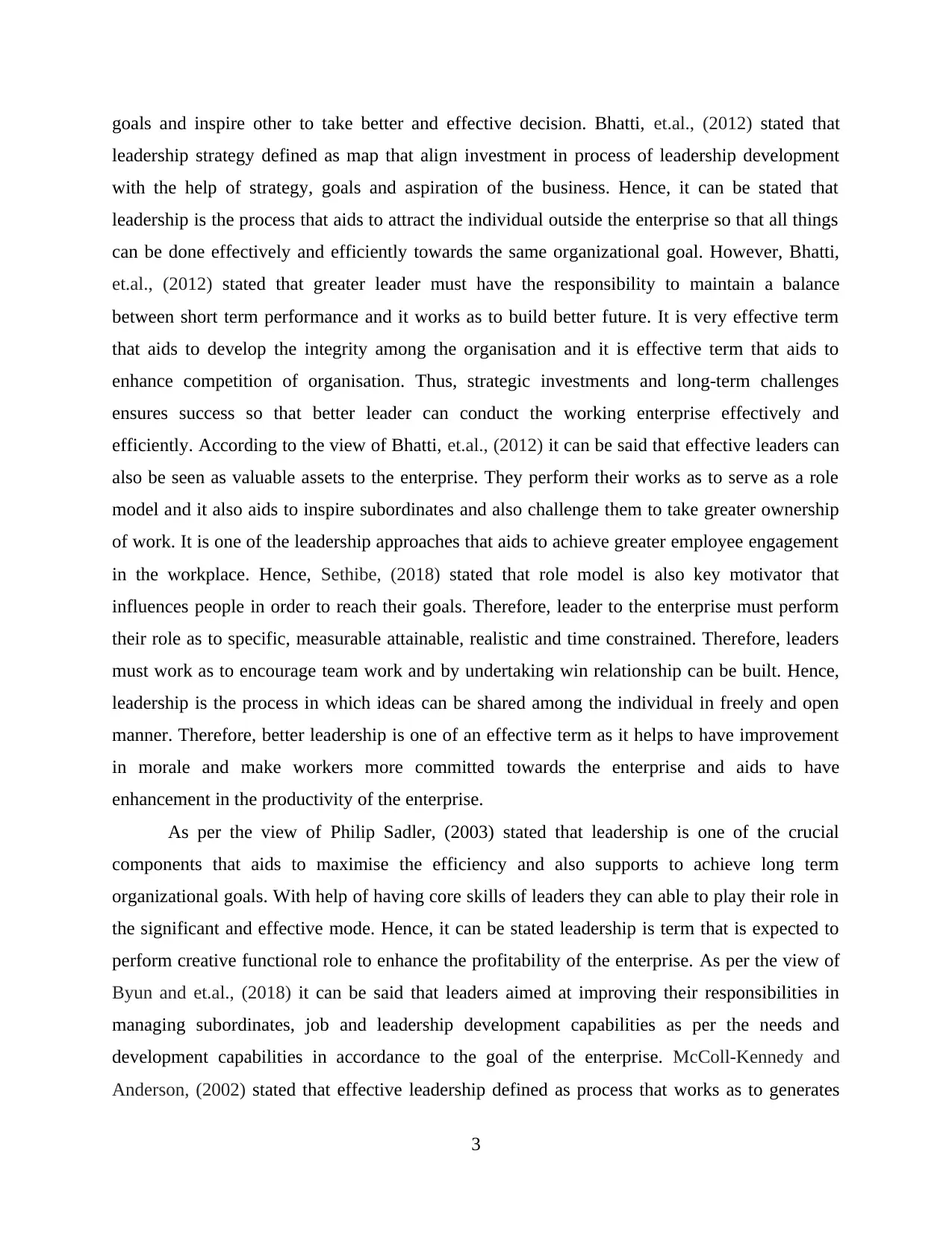
goals and inspire other to take better and effective decision. Bhatti, et.al., (2012) stated that
leadership strategy defined as map that align investment in process of leadership development
with the help of strategy, goals and aspiration of the business. Hence, it can be stated that
leadership is the process that aids to attract the individual outside the enterprise so that all things
can be done effectively and efficiently towards the same organizational goal. However, Bhatti,
et.al., (2012) stated that greater leader must have the responsibility to maintain a balance
between short term performance and it works as to build better future. It is very effective term
that aids to develop the integrity among the organisation and it is effective term that aids to
enhance competition of organisation. Thus, strategic investments and long-term challenges
ensures success so that better leader can conduct the working enterprise effectively and
efficiently. According to the view of Bhatti, et.al., (2012) it can be said that effective leaders can
also be seen as valuable assets to the enterprise. They perform their works as to serve as a role
model and it also aids to inspire subordinates and also challenge them to take greater ownership
of work. It is one of the leadership approaches that aids to achieve greater employee engagement
in the workplace. Hence, Sethibe, (2018) stated that role model is also key motivator that
influences people in order to reach their goals. Therefore, leader to the enterprise must perform
their role as to specific, measurable attainable, realistic and time constrained. Therefore, leaders
must work as to encourage team work and by undertaking win relationship can be built. Hence,
leadership is the process in which ideas can be shared among the individual in freely and open
manner. Therefore, better leadership is one of an effective term as it helps to have improvement
in morale and make workers more committed towards the enterprise and aids to have
enhancement in the productivity of the enterprise.
As per the view of Philip Sadler, (2003) stated that leadership is one of the crucial
components that aids to maximise the efficiency and also supports to achieve long term
organizational goals. With help of having core skills of leaders they can able to play their role in
the significant and effective mode. Hence, it can be stated leadership is term that is expected to
perform creative functional role to enhance the profitability of the enterprise. As per the view of
Byun and et.al., (2018) it can be said that leaders aimed at improving their responsibilities in
managing subordinates, job and leadership development capabilities as per the needs and
development capabilities in accordance to the goal of the enterprise. McColl-Kennedy and
Anderson, (2002) stated that effective leadership defined as process that works as to generates
3
leadership strategy defined as map that align investment in process of leadership development
with the help of strategy, goals and aspiration of the business. Hence, it can be stated that
leadership is the process that aids to attract the individual outside the enterprise so that all things
can be done effectively and efficiently towards the same organizational goal. However, Bhatti,
et.al., (2012) stated that greater leader must have the responsibility to maintain a balance
between short term performance and it works as to build better future. It is very effective term
that aids to develop the integrity among the organisation and it is effective term that aids to
enhance competition of organisation. Thus, strategic investments and long-term challenges
ensures success so that better leader can conduct the working enterprise effectively and
efficiently. According to the view of Bhatti, et.al., (2012) it can be said that effective leaders can
also be seen as valuable assets to the enterprise. They perform their works as to serve as a role
model and it also aids to inspire subordinates and also challenge them to take greater ownership
of work. It is one of the leadership approaches that aids to achieve greater employee engagement
in the workplace. Hence, Sethibe, (2018) stated that role model is also key motivator that
influences people in order to reach their goals. Therefore, leader to the enterprise must perform
their role as to specific, measurable attainable, realistic and time constrained. Therefore, leaders
must work as to encourage team work and by undertaking win relationship can be built. Hence,
leadership is the process in which ideas can be shared among the individual in freely and open
manner. Therefore, better leadership is one of an effective term as it helps to have improvement
in morale and make workers more committed towards the enterprise and aids to have
enhancement in the productivity of the enterprise.
As per the view of Philip Sadler, (2003) stated that leadership is one of the crucial
components that aids to maximise the efficiency and also supports to achieve long term
organizational goals. With help of having core skills of leaders they can able to play their role in
the significant and effective mode. Hence, it can be stated leadership is term that is expected to
perform creative functional role to enhance the profitability of the enterprise. As per the view of
Byun and et.al., (2018) it can be said that leaders aimed at improving their responsibilities in
managing subordinates, job and leadership development capabilities as per the needs and
development capabilities in accordance to the goal of the enterprise. McColl-Kennedy and
Anderson, (2002) stated that effective leadership defined as process that works as to generates
3
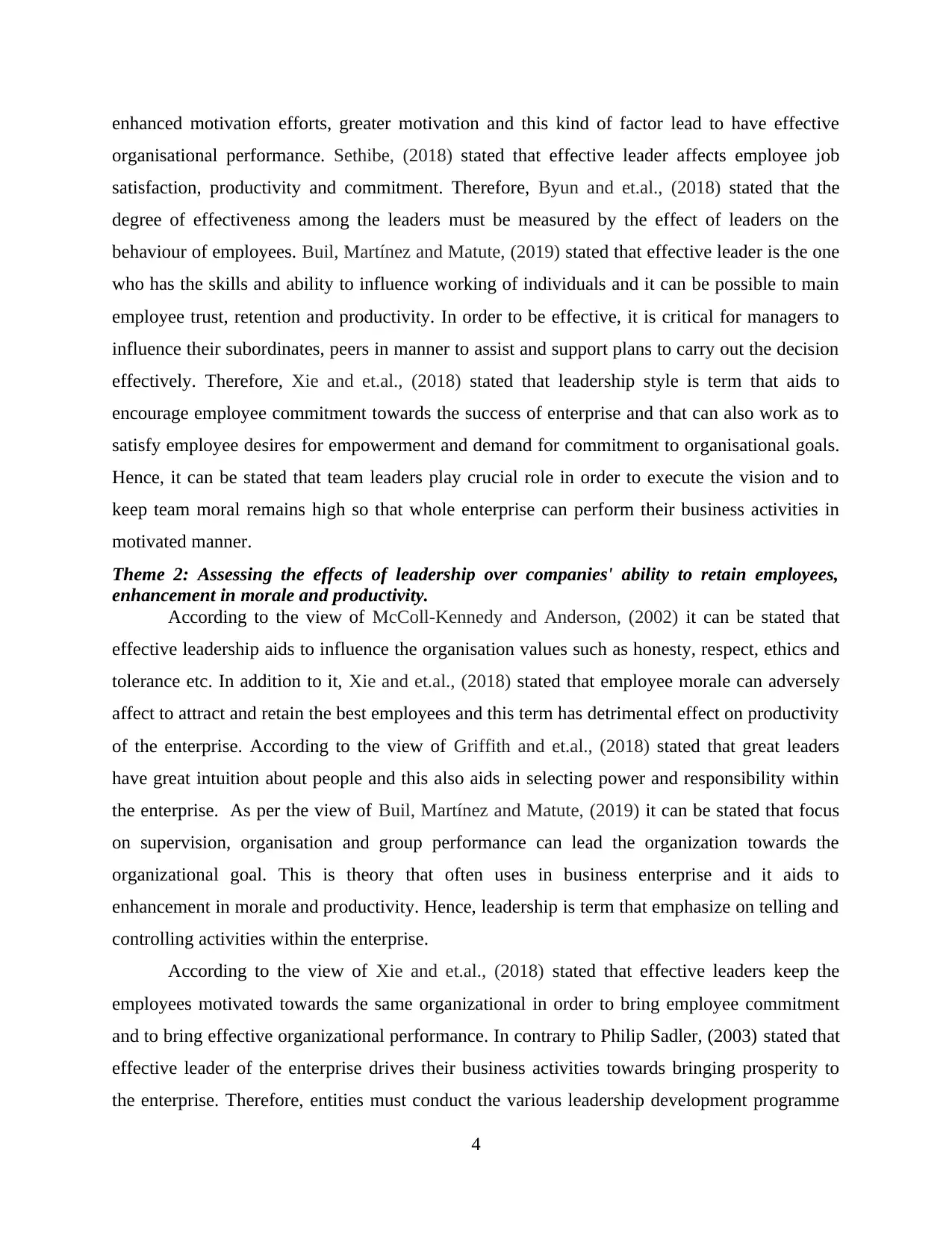
enhanced motivation efforts, greater motivation and this kind of factor lead to have effective
organisational performance. Sethibe, (2018) stated that effective leader affects employee job
satisfaction, productivity and commitment. Therefore, Byun and et.al., (2018) stated that the
degree of effectiveness among the leaders must be measured by the effect of leaders on the
behaviour of employees. Buil, Martínez and Matute, (2019) stated that effective leader is the one
who has the skills and ability to influence working of individuals and it can be possible to main
employee trust, retention and productivity. In order to be effective, it is critical for managers to
influence their subordinates, peers in manner to assist and support plans to carry out the decision
effectively. Therefore, Xie and et.al., (2018) stated that leadership style is term that aids to
encourage employee commitment towards the success of enterprise and that can also work as to
satisfy employee desires for empowerment and demand for commitment to organisational goals.
Hence, it can be stated that team leaders play crucial role in order to execute the vision and to
keep team moral remains high so that whole enterprise can perform their business activities in
motivated manner.
Theme 2: Assessing the effects of leadership over companies' ability to retain employees,
enhancement in morale and productivity.
According to the view of McColl-Kennedy and Anderson, (2002) it can be stated that
effective leadership aids to influence the organisation values such as honesty, respect, ethics and
tolerance etc. In addition to it, Xie and et.al., (2018) stated that employee morale can adversely
affect to attract and retain the best employees and this term has detrimental effect on productivity
of the enterprise. According to the view of Griffith and et.al., (2018) stated that great leaders
have great intuition about people and this also aids in selecting power and responsibility within
the enterprise. As per the view of Buil, Martínez and Matute, (2019) it can be stated that focus
on supervision, organisation and group performance can lead the organization towards the
organizational goal. This is theory that often uses in business enterprise and it aids to
enhancement in morale and productivity. Hence, leadership is term that emphasize on telling and
controlling activities within the enterprise.
According to the view of Xie and et.al., (2018) stated that effective leaders keep the
employees motivated towards the same organizational in order to bring employee commitment
and to bring effective organizational performance. In contrary to Philip Sadler, (2003) stated that
effective leader of the enterprise drives their business activities towards bringing prosperity to
the enterprise. Therefore, entities must conduct the various leadership development programme
4
organisational performance. Sethibe, (2018) stated that effective leader affects employee job
satisfaction, productivity and commitment. Therefore, Byun and et.al., (2018) stated that the
degree of effectiveness among the leaders must be measured by the effect of leaders on the
behaviour of employees. Buil, Martínez and Matute, (2019) stated that effective leader is the one
who has the skills and ability to influence working of individuals and it can be possible to main
employee trust, retention and productivity. In order to be effective, it is critical for managers to
influence their subordinates, peers in manner to assist and support plans to carry out the decision
effectively. Therefore, Xie and et.al., (2018) stated that leadership style is term that aids to
encourage employee commitment towards the success of enterprise and that can also work as to
satisfy employee desires for empowerment and demand for commitment to organisational goals.
Hence, it can be stated that team leaders play crucial role in order to execute the vision and to
keep team moral remains high so that whole enterprise can perform their business activities in
motivated manner.
Theme 2: Assessing the effects of leadership over companies' ability to retain employees,
enhancement in morale and productivity.
According to the view of McColl-Kennedy and Anderson, (2002) it can be stated that
effective leadership aids to influence the organisation values such as honesty, respect, ethics and
tolerance etc. In addition to it, Xie and et.al., (2018) stated that employee morale can adversely
affect to attract and retain the best employees and this term has detrimental effect on productivity
of the enterprise. According to the view of Griffith and et.al., (2018) stated that great leaders
have great intuition about people and this also aids in selecting power and responsibility within
the enterprise. As per the view of Buil, Martínez and Matute, (2019) it can be stated that focus
on supervision, organisation and group performance can lead the organization towards the
organizational goal. This is theory that often uses in business enterprise and it aids to
enhancement in morale and productivity. Hence, leadership is term that emphasize on telling and
controlling activities within the enterprise.
According to the view of Xie and et.al., (2018) stated that effective leaders keep the
employees motivated towards the same organizational in order to bring employee commitment
and to bring effective organizational performance. In contrary to Philip Sadler, (2003) stated that
effective leader of the enterprise drives their business activities towards bringing prosperity to
the enterprise. Therefore, entities must conduct the various leadership development programme
4
⊘ This is a preview!⊘
Do you want full access?
Subscribe today to unlock all pages.

Trusted by 1+ million students worldwide
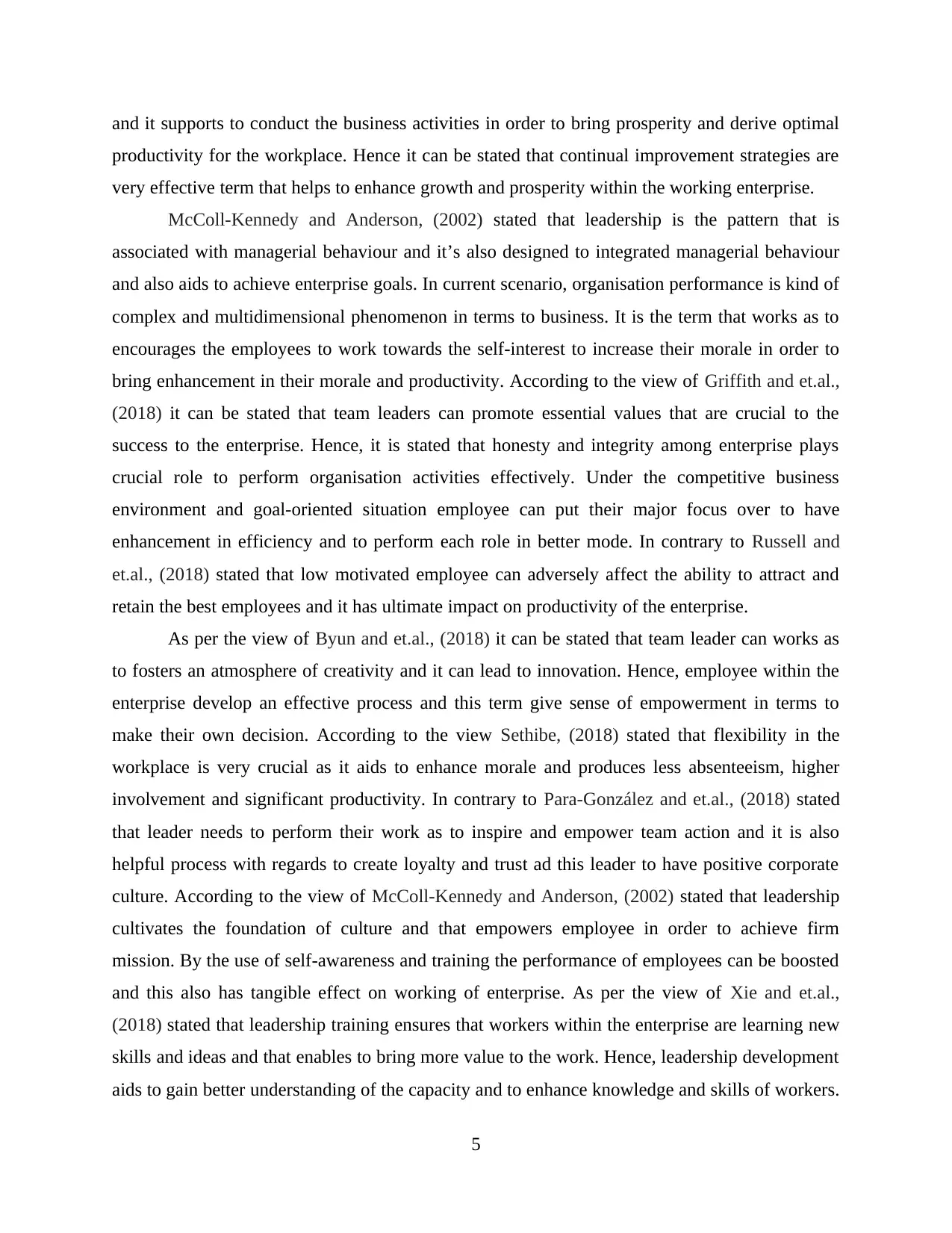
and it supports to conduct the business activities in order to bring prosperity and derive optimal
productivity for the workplace. Hence it can be stated that continual improvement strategies are
very effective term that helps to enhance growth and prosperity within the working enterprise.
McColl-Kennedy and Anderson, (2002) stated that leadership is the pattern that is
associated with managerial behaviour and it’s also designed to integrated managerial behaviour
and also aids to achieve enterprise goals. In current scenario, organisation performance is kind of
complex and multidimensional phenomenon in terms to business. It is the term that works as to
encourages the employees to work towards the self-interest to increase their morale in order to
bring enhancement in their morale and productivity. According to the view of Griffith and et.al.,
(2018) it can be stated that team leaders can promote essential values that are crucial to the
success to the enterprise. Hence, it is stated that honesty and integrity among enterprise plays
crucial role to perform organisation activities effectively. Under the competitive business
environment and goal-oriented situation employee can put their major focus over to have
enhancement in efficiency and to perform each role in better mode. In contrary to Russell and
et.al., (2018) stated that low motivated employee can adversely affect the ability to attract and
retain the best employees and it has ultimate impact on productivity of the enterprise.
As per the view of Byun and et.al., (2018) it can be stated that team leader can works as
to fosters an atmosphere of creativity and it can lead to innovation. Hence, employee within the
enterprise develop an effective process and this term give sense of empowerment in terms to
make their own decision. According to the view Sethibe, (2018) stated that flexibility in the
workplace is very crucial as it aids to enhance morale and produces less absenteeism, higher
involvement and significant productivity. In contrary to Para-González and et.al., (2018) stated
that leader needs to perform their work as to inspire and empower team action and it is also
helpful process with regards to create loyalty and trust ad this leader to have positive corporate
culture. According to the view of McColl-Kennedy and Anderson, (2002) stated that leadership
cultivates the foundation of culture and that empowers employee in order to achieve firm
mission. By the use of self-awareness and training the performance of employees can be boosted
and this also has tangible effect on working of enterprise. As per the view of Xie and et.al.,
(2018) stated that leadership training ensures that workers within the enterprise are learning new
skills and ideas and that enables to bring more value to the work. Hence, leadership development
aids to gain better understanding of the capacity and to enhance knowledge and skills of workers.
5
productivity for the workplace. Hence it can be stated that continual improvement strategies are
very effective term that helps to enhance growth and prosperity within the working enterprise.
McColl-Kennedy and Anderson, (2002) stated that leadership is the pattern that is
associated with managerial behaviour and it’s also designed to integrated managerial behaviour
and also aids to achieve enterprise goals. In current scenario, organisation performance is kind of
complex and multidimensional phenomenon in terms to business. It is the term that works as to
encourages the employees to work towards the self-interest to increase their morale in order to
bring enhancement in their morale and productivity. According to the view of Griffith and et.al.,
(2018) it can be stated that team leaders can promote essential values that are crucial to the
success to the enterprise. Hence, it is stated that honesty and integrity among enterprise plays
crucial role to perform organisation activities effectively. Under the competitive business
environment and goal-oriented situation employee can put their major focus over to have
enhancement in efficiency and to perform each role in better mode. In contrary to Russell and
et.al., (2018) stated that low motivated employee can adversely affect the ability to attract and
retain the best employees and it has ultimate impact on productivity of the enterprise.
As per the view of Byun and et.al., (2018) it can be stated that team leader can works as
to fosters an atmosphere of creativity and it can lead to innovation. Hence, employee within the
enterprise develop an effective process and this term give sense of empowerment in terms to
make their own decision. According to the view Sethibe, (2018) stated that flexibility in the
workplace is very crucial as it aids to enhance morale and produces less absenteeism, higher
involvement and significant productivity. In contrary to Para-González and et.al., (2018) stated
that leader needs to perform their work as to inspire and empower team action and it is also
helpful process with regards to create loyalty and trust ad this leader to have positive corporate
culture. According to the view of McColl-Kennedy and Anderson, (2002) stated that leadership
cultivates the foundation of culture and that empowers employee in order to achieve firm
mission. By the use of self-awareness and training the performance of employees can be boosted
and this also has tangible effect on working of enterprise. As per the view of Xie and et.al.,
(2018) stated that leadership training ensures that workers within the enterprise are learning new
skills and ideas and that enables to bring more value to the work. Hence, leadership development
aids to gain better understanding of the capacity and to enhance knowledge and skills of workers.
5
Paraphrase This Document
Need a fresh take? Get an instant paraphrase of this document with our AI Paraphraser
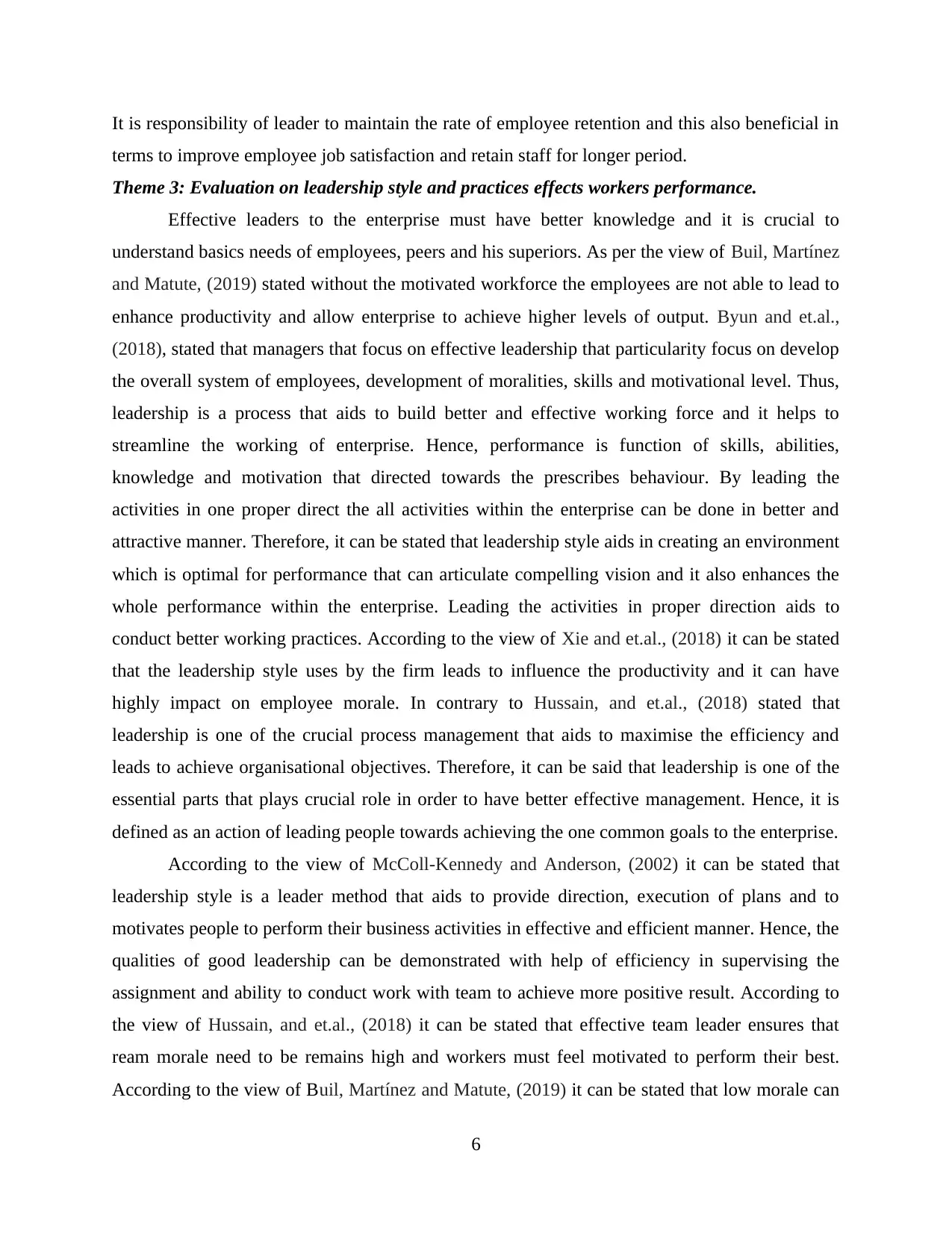
It is responsibility of leader to maintain the rate of employee retention and this also beneficial in
terms to improve employee job satisfaction and retain staff for longer period.
Theme 3: Evaluation on leadership style and practices effects workers performance.
Effective leaders to the enterprise must have better knowledge and it is crucial to
understand basics needs of employees, peers and his superiors. As per the view of Buil, Martínez
and Matute, (2019) stated without the motivated workforce the employees are not able to lead to
enhance productivity and allow enterprise to achieve higher levels of output. Byun and et.al.,
(2018), stated that managers that focus on effective leadership that particularity focus on develop
the overall system of employees, development of moralities, skills and motivational level. Thus,
leadership is a process that aids to build better and effective working force and it helps to
streamline the working of enterprise. Hence, performance is function of skills, abilities,
knowledge and motivation that directed towards the prescribes behaviour. By leading the
activities in one proper direct the all activities within the enterprise can be done in better and
attractive manner. Therefore, it can be stated that leadership style aids in creating an environment
which is optimal for performance that can articulate compelling vision and it also enhances the
whole performance within the enterprise. Leading the activities in proper direction aids to
conduct better working practices. According to the view of Xie and et.al., (2018) it can be stated
that the leadership style uses by the firm leads to influence the productivity and it can have
highly impact on employee morale. In contrary to Hussain, and et.al., (2018) stated that
leadership is one of the crucial process management that aids to maximise the efficiency and
leads to achieve organisational objectives. Therefore, it can be said that leadership is one of the
essential parts that plays crucial role in order to have better effective management. Hence, it is
defined as an action of leading people towards achieving the one common goals to the enterprise.
According to the view of McColl-Kennedy and Anderson, (2002) it can be stated that
leadership style is a leader method that aids to provide direction, execution of plans and to
motivates people to perform their business activities in effective and efficient manner. Hence, the
qualities of good leadership can be demonstrated with help of efficiency in supervising the
assignment and ability to conduct work with team to achieve more positive result. According to
the view of Hussain, and et.al., (2018) it can be stated that effective team leader ensures that
ream morale need to be remains high and workers must feel motivated to perform their best.
According to the view of Buil, Martínez and Matute, (2019) it can be stated that low morale can
6
terms to improve employee job satisfaction and retain staff for longer period.
Theme 3: Evaluation on leadership style and practices effects workers performance.
Effective leaders to the enterprise must have better knowledge and it is crucial to
understand basics needs of employees, peers and his superiors. As per the view of Buil, Martínez
and Matute, (2019) stated without the motivated workforce the employees are not able to lead to
enhance productivity and allow enterprise to achieve higher levels of output. Byun and et.al.,
(2018), stated that managers that focus on effective leadership that particularity focus on develop
the overall system of employees, development of moralities, skills and motivational level. Thus,
leadership is a process that aids to build better and effective working force and it helps to
streamline the working of enterprise. Hence, performance is function of skills, abilities,
knowledge and motivation that directed towards the prescribes behaviour. By leading the
activities in one proper direct the all activities within the enterprise can be done in better and
attractive manner. Therefore, it can be stated that leadership style aids in creating an environment
which is optimal for performance that can articulate compelling vision and it also enhances the
whole performance within the enterprise. Leading the activities in proper direction aids to
conduct better working practices. According to the view of Xie and et.al., (2018) it can be stated
that the leadership style uses by the firm leads to influence the productivity and it can have
highly impact on employee morale. In contrary to Hussain, and et.al., (2018) stated that
leadership is one of the crucial process management that aids to maximise the efficiency and
leads to achieve organisational objectives. Therefore, it can be said that leadership is one of the
essential parts that plays crucial role in order to have better effective management. Hence, it is
defined as an action of leading people towards achieving the one common goals to the enterprise.
According to the view of McColl-Kennedy and Anderson, (2002) it can be stated that
leadership style is a leader method that aids to provide direction, execution of plans and to
motivates people to perform their business activities in effective and efficient manner. Hence, the
qualities of good leadership can be demonstrated with help of efficiency in supervising the
assignment and ability to conduct work with team to achieve more positive result. According to
the view of Hussain, and et.al., (2018) it can be stated that effective team leader ensures that
ream morale need to be remains high and workers must feel motivated to perform their best.
According to the view of Buil, Martínez and Matute, (2019) it can be stated that low morale can
6
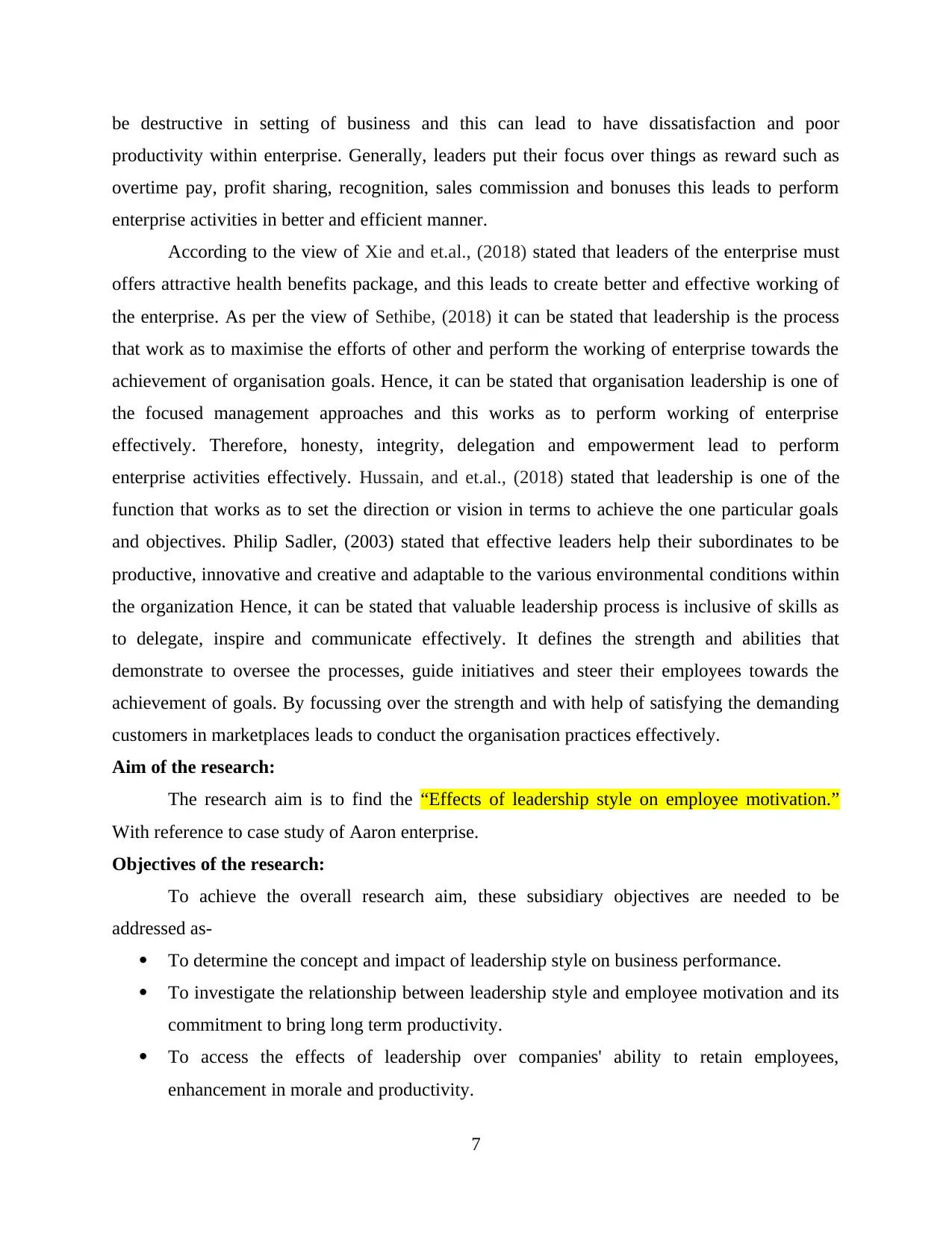
be destructive in setting of business and this can lead to have dissatisfaction and poor
productivity within enterprise. Generally, leaders put their focus over things as reward such as
overtime pay, profit sharing, recognition, sales commission and bonuses this leads to perform
enterprise activities in better and efficient manner.
According to the view of Xie and et.al., (2018) stated that leaders of the enterprise must
offers attractive health benefits package, and this leads to create better and effective working of
the enterprise. As per the view of Sethibe, (2018) it can be stated that leadership is the process
that work as to maximise the efforts of other and perform the working of enterprise towards the
achievement of organisation goals. Hence, it can be stated that organisation leadership is one of
the focused management approaches and this works as to perform working of enterprise
effectively. Therefore, honesty, integrity, delegation and empowerment lead to perform
enterprise activities effectively. Hussain, and et.al., (2018) stated that leadership is one of the
function that works as to set the direction or vision in terms to achieve the one particular goals
and objectives. Philip Sadler, (2003) stated that effective leaders help their subordinates to be
productive, innovative and creative and adaptable to the various environmental conditions within
the organization Hence, it can be stated that valuable leadership process is inclusive of skills as
to delegate, inspire and communicate effectively. It defines the strength and abilities that
demonstrate to oversee the processes, guide initiatives and steer their employees towards the
achievement of goals. By focussing over the strength and with help of satisfying the demanding
customers in marketplaces leads to conduct the organisation practices effectively.
Aim of the research:
The research aim is to find the “Effects of leadership style on employee motivation.”
With reference to case study of Aaron enterprise.
Objectives of the research:
To achieve the overall research aim, these subsidiary objectives are needed to be
addressed as-
To determine the concept and impact of leadership style on business performance.
To investigate the relationship between leadership style and employee motivation and its
commitment to bring long term productivity.
To access the effects of leadership over companies' ability to retain employees,
enhancement in morale and productivity.
7
productivity within enterprise. Generally, leaders put their focus over things as reward such as
overtime pay, profit sharing, recognition, sales commission and bonuses this leads to perform
enterprise activities in better and efficient manner.
According to the view of Xie and et.al., (2018) stated that leaders of the enterprise must
offers attractive health benefits package, and this leads to create better and effective working of
the enterprise. As per the view of Sethibe, (2018) it can be stated that leadership is the process
that work as to maximise the efforts of other and perform the working of enterprise towards the
achievement of organisation goals. Hence, it can be stated that organisation leadership is one of
the focused management approaches and this works as to perform working of enterprise
effectively. Therefore, honesty, integrity, delegation and empowerment lead to perform
enterprise activities effectively. Hussain, and et.al., (2018) stated that leadership is one of the
function that works as to set the direction or vision in terms to achieve the one particular goals
and objectives. Philip Sadler, (2003) stated that effective leaders help their subordinates to be
productive, innovative and creative and adaptable to the various environmental conditions within
the organization Hence, it can be stated that valuable leadership process is inclusive of skills as
to delegate, inspire and communicate effectively. It defines the strength and abilities that
demonstrate to oversee the processes, guide initiatives and steer their employees towards the
achievement of goals. By focussing over the strength and with help of satisfying the demanding
customers in marketplaces leads to conduct the organisation practices effectively.
Aim of the research:
The research aim is to find the “Effects of leadership style on employee motivation.”
With reference to case study of Aaron enterprise.
Objectives of the research:
To achieve the overall research aim, these subsidiary objectives are needed to be
addressed as-
To determine the concept and impact of leadership style on business performance.
To investigate the relationship between leadership style and employee motivation and its
commitment to bring long term productivity.
To access the effects of leadership over companies' ability to retain employees,
enhancement in morale and productivity.
7
⊘ This is a preview!⊘
Do you want full access?
Subscribe today to unlock all pages.

Trusted by 1+ million students worldwide
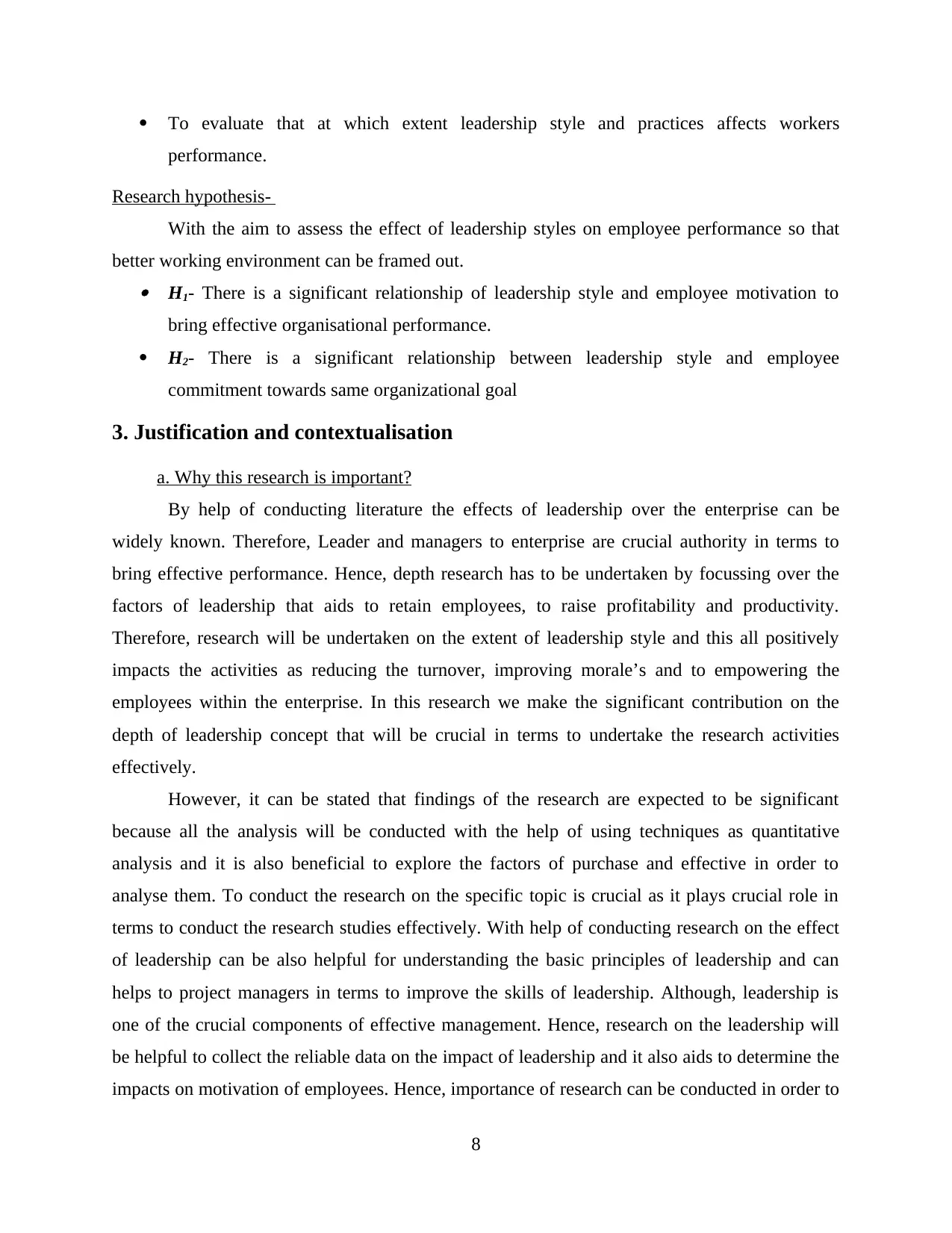
To evaluate that at which extent leadership style and practices affects workers
performance.
Research hypothesis-
With the aim to assess the effect of leadership styles on employee performance so that
better working environment can be framed out. H1- There is a significant relationship of leadership style and employee motivation to
bring effective organisational performance.
H2- There is a significant relationship between leadership style and employee
commitment towards same organizational goal
3. Justification and contextualisation
a. Why this research is important?
By help of conducting literature the effects of leadership over the enterprise can be
widely known. Therefore, Leader and managers to enterprise are crucial authority in terms to
bring effective performance. Hence, depth research has to be undertaken by focussing over the
factors of leadership that aids to retain employees, to raise profitability and productivity.
Therefore, research will be undertaken on the extent of leadership style and this all positively
impacts the activities as reducing the turnover, improving morale’s and to empowering the
employees within the enterprise. In this research we make the significant contribution on the
depth of leadership concept that will be crucial in terms to undertake the research activities
effectively.
However, it can be stated that findings of the research are expected to be significant
because all the analysis will be conducted with the help of using techniques as quantitative
analysis and it is also beneficial to explore the factors of purchase and effective in order to
analyse them. To conduct the research on the specific topic is crucial as it plays crucial role in
terms to conduct the research studies effectively. With help of conducting research on the effect
of leadership can be also helpful for understanding the basic principles of leadership and can
helps to project managers in terms to improve the skills of leadership. Although, leadership is
one of the crucial components of effective management. Hence, research on the leadership will
be helpful to collect the reliable data on the impact of leadership and it also aids to determine the
impacts on motivation of employees. Hence, importance of research can be conducted in order to
8
performance.
Research hypothesis-
With the aim to assess the effect of leadership styles on employee performance so that
better working environment can be framed out. H1- There is a significant relationship of leadership style and employee motivation to
bring effective organisational performance.
H2- There is a significant relationship between leadership style and employee
commitment towards same organizational goal
3. Justification and contextualisation
a. Why this research is important?
By help of conducting literature the effects of leadership over the enterprise can be
widely known. Therefore, Leader and managers to enterprise are crucial authority in terms to
bring effective performance. Hence, depth research has to be undertaken by focussing over the
factors of leadership that aids to retain employees, to raise profitability and productivity.
Therefore, research will be undertaken on the extent of leadership style and this all positively
impacts the activities as reducing the turnover, improving morale’s and to empowering the
employees within the enterprise. In this research we make the significant contribution on the
depth of leadership concept that will be crucial in terms to undertake the research activities
effectively.
However, it can be stated that findings of the research are expected to be significant
because all the analysis will be conducted with the help of using techniques as quantitative
analysis and it is also beneficial to explore the factors of purchase and effective in order to
analyse them. To conduct the research on the specific topic is crucial as it plays crucial role in
terms to conduct the research studies effectively. With help of conducting research on the effect
of leadership can be also helpful for understanding the basic principles of leadership and can
helps to project managers in terms to improve the skills of leadership. Although, leadership is
one of the crucial components of effective management. Hence, research on the leadership will
be helpful to collect the reliable data on the impact of leadership and it also aids to determine the
impacts on motivation of employees. Hence, importance of research can be conducted in order to
8
Paraphrase This Document
Need a fresh take? Get an instant paraphrase of this document with our AI Paraphraser
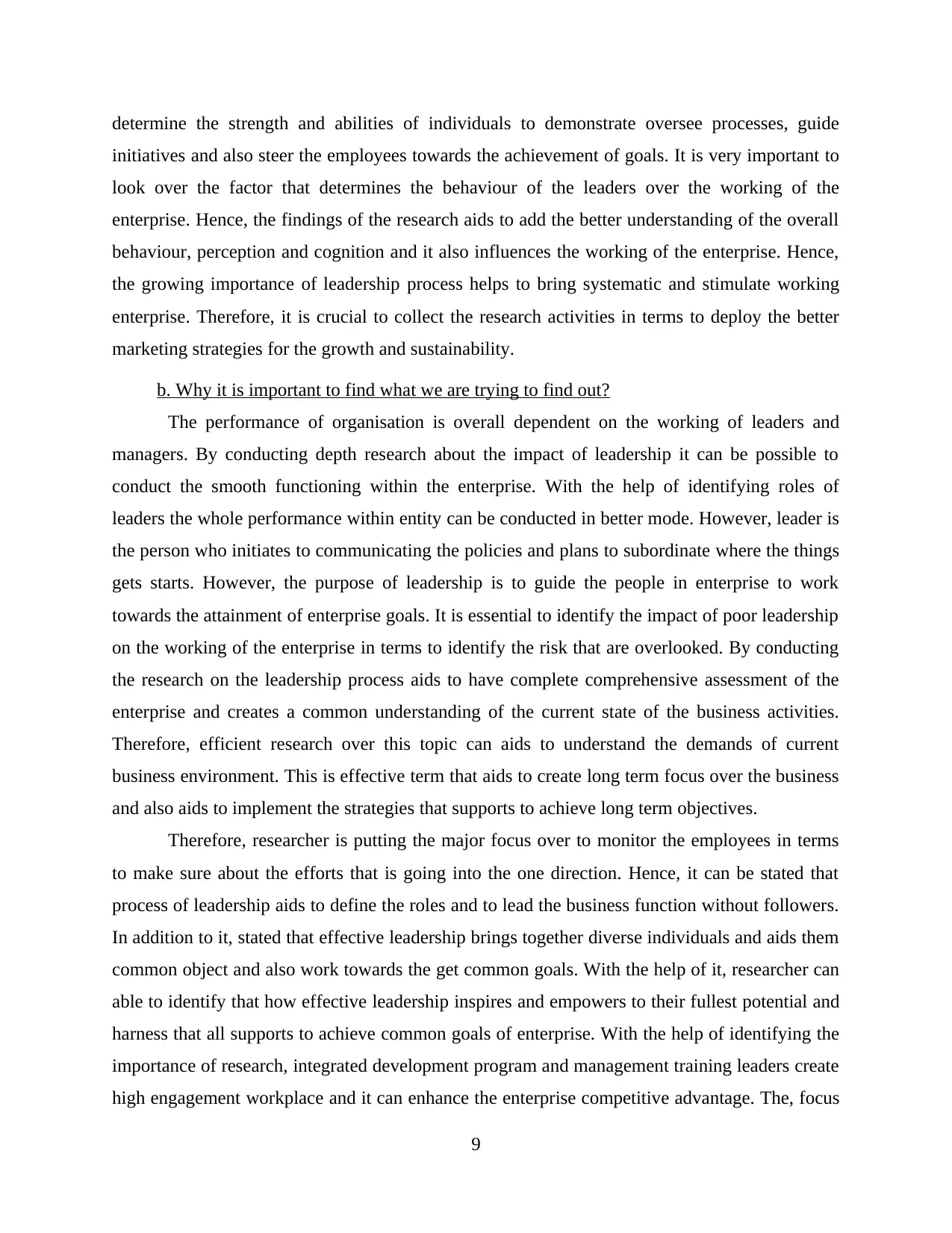
determine the strength and abilities of individuals to demonstrate oversee processes, guide
initiatives and also steer the employees towards the achievement of goals. It is very important to
look over the factor that determines the behaviour of the leaders over the working of the
enterprise. Hence, the findings of the research aids to add the better understanding of the overall
behaviour, perception and cognition and it also influences the working of the enterprise. Hence,
the growing importance of leadership process helps to bring systematic and stimulate working
enterprise. Therefore, it is crucial to collect the research activities in terms to deploy the better
marketing strategies for the growth and sustainability.
b. Why it is important to find what we are trying to find out?
The performance of organisation is overall dependent on the working of leaders and
managers. By conducting depth research about the impact of leadership it can be possible to
conduct the smooth functioning within the enterprise. With the help of identifying roles of
leaders the whole performance within entity can be conducted in better mode. However, leader is
the person who initiates to communicating the policies and plans to subordinate where the things
gets starts. However, the purpose of leadership is to guide the people in enterprise to work
towards the attainment of enterprise goals. It is essential to identify the impact of poor leadership
on the working of the enterprise in terms to identify the risk that are overlooked. By conducting
the research on the leadership process aids to have complete comprehensive assessment of the
enterprise and creates a common understanding of the current state of the business activities.
Therefore, efficient research over this topic can aids to understand the demands of current
business environment. This is effective term that aids to create long term focus over the business
and also aids to implement the strategies that supports to achieve long term objectives.
Therefore, researcher is putting the major focus over to monitor the employees in terms
to make sure about the efforts that is going into the one direction. Hence, it can be stated that
process of leadership aids to define the roles and to lead the business function without followers.
In addition to it, stated that effective leadership brings together diverse individuals and aids them
common object and also work towards the get common goals. With the help of it, researcher can
able to identify that how effective leadership inspires and empowers to their fullest potential and
harness that all supports to achieve common goals of enterprise. With the help of identifying the
importance of research, integrated development program and management training leaders create
high engagement workplace and it can enhance the enterprise competitive advantage. The, focus
9
initiatives and also steer the employees towards the achievement of goals. It is very important to
look over the factor that determines the behaviour of the leaders over the working of the
enterprise. Hence, the findings of the research aids to add the better understanding of the overall
behaviour, perception and cognition and it also influences the working of the enterprise. Hence,
the growing importance of leadership process helps to bring systematic and stimulate working
enterprise. Therefore, it is crucial to collect the research activities in terms to deploy the better
marketing strategies for the growth and sustainability.
b. Why it is important to find what we are trying to find out?
The performance of organisation is overall dependent on the working of leaders and
managers. By conducting depth research about the impact of leadership it can be possible to
conduct the smooth functioning within the enterprise. With the help of identifying roles of
leaders the whole performance within entity can be conducted in better mode. However, leader is
the person who initiates to communicating the policies and plans to subordinate where the things
gets starts. However, the purpose of leadership is to guide the people in enterprise to work
towards the attainment of enterprise goals. It is essential to identify the impact of poor leadership
on the working of the enterprise in terms to identify the risk that are overlooked. By conducting
the research on the leadership process aids to have complete comprehensive assessment of the
enterprise and creates a common understanding of the current state of the business activities.
Therefore, efficient research over this topic can aids to understand the demands of current
business environment. This is effective term that aids to create long term focus over the business
and also aids to implement the strategies that supports to achieve long term objectives.
Therefore, researcher is putting the major focus over to monitor the employees in terms
to make sure about the efforts that is going into the one direction. Hence, it can be stated that
process of leadership aids to define the roles and to lead the business function without followers.
In addition to it, stated that effective leadership brings together diverse individuals and aids them
common object and also work towards the get common goals. With the help of it, researcher can
able to identify that how effective leadership inspires and empowers to their fullest potential and
harness that all supports to achieve common goals of enterprise. With the help of identifying the
importance of research, integrated development program and management training leaders create
high engagement workplace and it can enhance the enterprise competitive advantage. The, focus
9
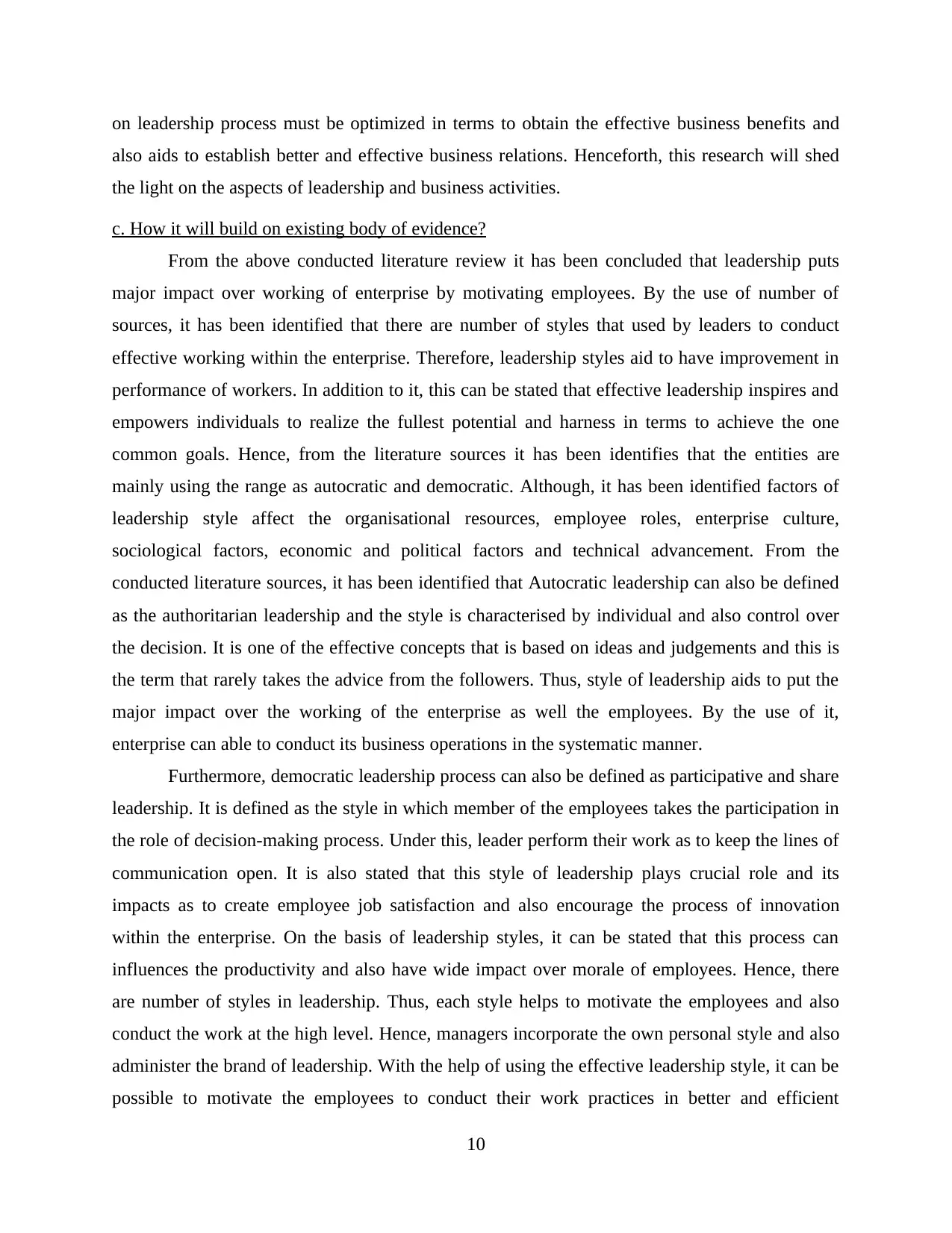
on leadership process must be optimized in terms to obtain the effective business benefits and
also aids to establish better and effective business relations. Henceforth, this research will shed
the light on the aspects of leadership and business activities.
c. How it will build on existing body of evidence?
From the above conducted literature review it has been concluded that leadership puts
major impact over working of enterprise by motivating employees. By the use of number of
sources, it has been identified that there are number of styles that used by leaders to conduct
effective working within the enterprise. Therefore, leadership styles aid to have improvement in
performance of workers. In addition to it, this can be stated that effective leadership inspires and
empowers individuals to realize the fullest potential and harness in terms to achieve the one
common goals. Hence, from the literature sources it has been identifies that the entities are
mainly using the range as autocratic and democratic. Although, it has been identified factors of
leadership style affect the organisational resources, employee roles, enterprise culture,
sociological factors, economic and political factors and technical advancement. From the
conducted literature sources, it has been identified that Autocratic leadership can also be defined
as the authoritarian leadership and the style is characterised by individual and also control over
the decision. It is one of the effective concepts that is based on ideas and judgements and this is
the term that rarely takes the advice from the followers. Thus, style of leadership aids to put the
major impact over the working of the enterprise as well the employees. By the use of it,
enterprise can able to conduct its business operations in the systematic manner.
Furthermore, democratic leadership process can also be defined as participative and share
leadership. It is defined as the style in which member of the employees takes the participation in
the role of decision-making process. Under this, leader perform their work as to keep the lines of
communication open. It is also stated that this style of leadership plays crucial role and its
impacts as to create employee job satisfaction and also encourage the process of innovation
within the enterprise. On the basis of leadership styles, it can be stated that this process can
influences the productivity and also have wide impact over morale of employees. Hence, there
are number of styles in leadership. Thus, each style helps to motivate the employees and also
conduct the work at the high level. Hence, managers incorporate the own personal style and also
administer the brand of leadership. With the help of using the effective leadership style, it can be
possible to motivate the employees to conduct their work practices in better and efficient
10
also aids to establish better and effective business relations. Henceforth, this research will shed
the light on the aspects of leadership and business activities.
c. How it will build on existing body of evidence?
From the above conducted literature review it has been concluded that leadership puts
major impact over working of enterprise by motivating employees. By the use of number of
sources, it has been identified that there are number of styles that used by leaders to conduct
effective working within the enterprise. Therefore, leadership styles aid to have improvement in
performance of workers. In addition to it, this can be stated that effective leadership inspires and
empowers individuals to realize the fullest potential and harness in terms to achieve the one
common goals. Hence, from the literature sources it has been identifies that the entities are
mainly using the range as autocratic and democratic. Although, it has been identified factors of
leadership style affect the organisational resources, employee roles, enterprise culture,
sociological factors, economic and political factors and technical advancement. From the
conducted literature sources, it has been identified that Autocratic leadership can also be defined
as the authoritarian leadership and the style is characterised by individual and also control over
the decision. It is one of the effective concepts that is based on ideas and judgements and this is
the term that rarely takes the advice from the followers. Thus, style of leadership aids to put the
major impact over the working of the enterprise as well the employees. By the use of it,
enterprise can able to conduct its business operations in the systematic manner.
Furthermore, democratic leadership process can also be defined as participative and share
leadership. It is defined as the style in which member of the employees takes the participation in
the role of decision-making process. Under this, leader perform their work as to keep the lines of
communication open. It is also stated that this style of leadership plays crucial role and its
impacts as to create employee job satisfaction and also encourage the process of innovation
within the enterprise. On the basis of leadership styles, it can be stated that this process can
influences the productivity and also have wide impact over morale of employees. Hence, there
are number of styles in leadership. Thus, each style helps to motivate the employees and also
conduct the work at the high level. Hence, managers incorporate the own personal style and also
administer the brand of leadership. With the help of using the effective leadership style, it can be
possible to motivate the employees to conduct their work practices in better and efficient
10
⊘ This is a preview!⊘
Do you want full access?
Subscribe today to unlock all pages.

Trusted by 1+ million students worldwide
1 out of 33
Related Documents
Your All-in-One AI-Powered Toolkit for Academic Success.
+13062052269
info@desklib.com
Available 24*7 on WhatsApp / Email
![[object Object]](/_next/static/media/star-bottom.7253800d.svg)
Unlock your academic potential
Copyright © 2020–2026 A2Z Services. All Rights Reserved. Developed and managed by ZUCOL.





